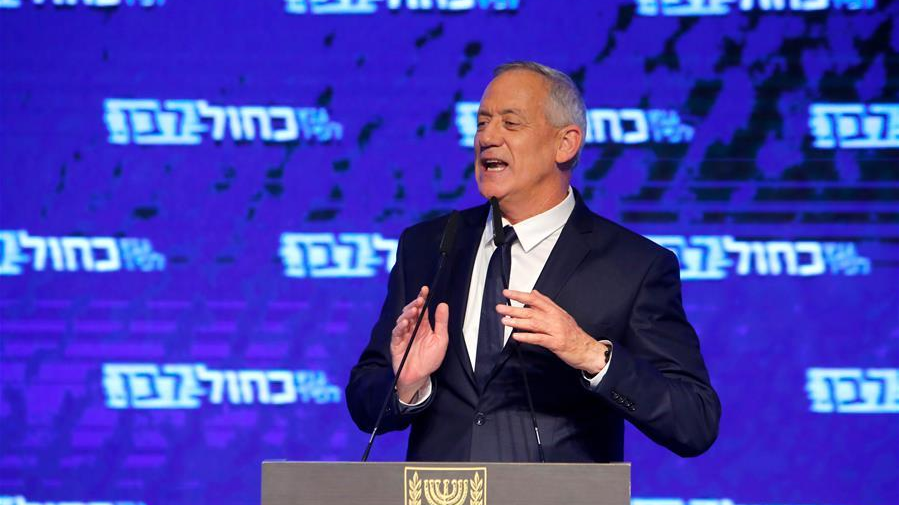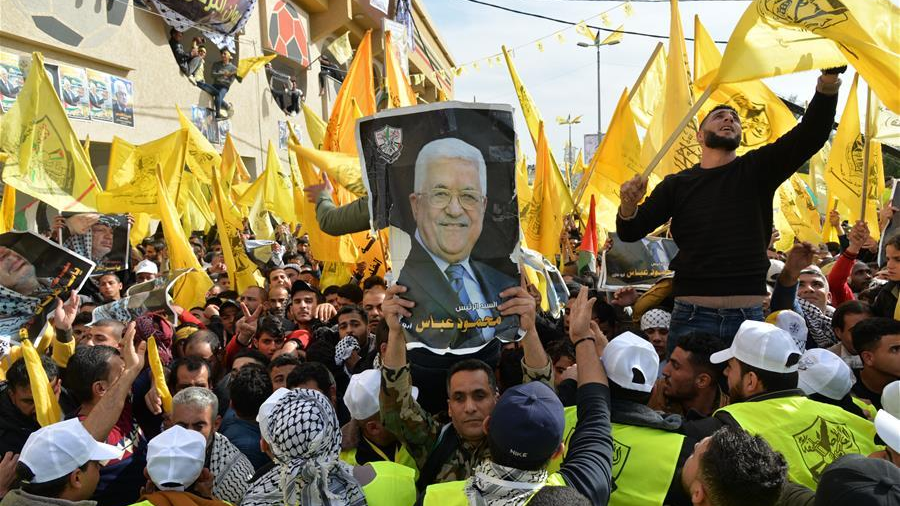
Benny Gantz, the main leader of the Blue and White party and a former chief of the Israeli forces, speaks to supporters in Tel Aviv, Israel, April 9, 2019. /Xinhua
Benny Gantz, the main leader of the Blue and White party and a former chief of the Israeli forces, speaks to supporters in Tel Aviv, Israel, April 9, 2019. /Xinhua
Editor's note: Guy Burton is an adjunct professor at Vesalius College, Brussels. The article reflects the author's opinions and not necessarily the views of CGTN.
Although elections are scheduled to take place in Israel and the Palestinian Authority in the next few months, the prospects for both could not be more different. In Israel the main question seems to be whether or not Benjamin Netanyahu becomes prime minister again. For the Palestinians, it is still not yet certain that the elections will take place at all.
Why to speak about the difference between the two? Arguably, the main reason comes down to the reasons why the elections are being held. In Israel, the causes have been domestic. For the Palestinians, the pressure for elections has come from outside.
In Israel, the prospect for a fourth election in two years became inevitable once the eight-month-old coalition government fell in December 2020. Netanyahu and his rival in the recent polls, Benny Gantz, had put aside their differences after the March 2020 poll.
Gantz was criticized at the time. Although his Blue and White party occupied the center-right ground like Netanyahu's Likud party, Gantz had built himself up by pledging to keep Netanyahu out of the prime minister's chair.
Gantz defended his broken promise by saying the country needed unity, given the rising public health and economic crisis associated with the COVID-19 pandemic at the time. But in making his deal with Netanyahu, he split his party.
Although Netanyahu and Gantz agreed to share the job of prime minister, neither trusted the other. Relations between the two men did not improve. They remained fractious, leading to the breakdown of the government and the two accusing the other of bad faith.
Since then, Israel has been in the middle of an election campaign. There is still another month before the polls open on March 23. Currently, Likud is leading in the polls and will likely be returned as the largest party. However, it will not have enough seats to form a government on its own. If Netanyahu is to remain prime minister, he will need to build a coalition with other parties.
It will not be easy for Netanyahu to find partners. Although the polls suggest that the parties on the right of the political spectrum will win most of the seats next month, several of their leaders have stated their unwillingness to work with Netanyahu. Perhaps for that reason, Netanyahu has done what many considered unthinkable, by courting some of the more conservative voters among the "48 Palestinians" – the indigenous Arab population who because of their presence at the time of independence meant they automatically became citizens of Israel.
Netanyahu's efforts to cultivate the "48 Palestinian" vote has already had one consequence. It has split the Joint List, the coalition of four Arab parties, whose 15 seats at the last election made it the third largest group in the Knesset (the Israeli parliament). The split may lead to a poorer showing next month and lessen the prospect of Jewish-Arab partnership in government.
At the same time, the chances for Jewish-Arab partnership are not helped by the poor performance of other political parties in Israel, especially in the center and the left. Currently, the remainder of the Joint List, Labor and Meretz – the center and leftist parties in Israel – are not expected to gain more than 20 seats in total – leaving them more than 40 short of forming a government.
Beyond the various political calculations taking place, public opinion over both the economy and the government's handling of the COVID-19 vaccination program will likely influence the outcome of the election. Israel has administered more than 7.6 million doses so far, making its vaccination rate the highest in the world, at 88.8 doses per 100 people.
Such considerations all point towards domestic considerations being paramount regarding Israel's election. By contrast, external factors seem more important for the Palestinian elections.
President Mahmoud Abbas announced that legislative elections will take place on May 22 and presidential elections on July 31. The move towards elections took place last autumn in the wake of both the Israeli normalization deals with the UAE, Bahrain and Morocco.
The normalization deals were a shock for the Palestinians. They challenged the longstanding assumption that Arab countries would not recognize Israel until a full and final peace settlement had been agreed with the Palestinians. That move only compounded Palestinians' fear of the growing regional irrelevance; while the Palestinian question has been a central Arab concern for decades, arguably, the economic weight and political influence of the Gulf has shifted leaders' focus towards the east. In addition, the peace process has not only stagnated, but been sidestepped during Donald Trump's presidency, when the U.S. became more explicit in its support and defense of Israeli interests and ambitions.

Palestinian supporters take part in a rally marking the 55th anniversary of the Fatah movement in Gaza City, January 1, 2020. /Xinhua
Palestinian supporters take part in a rally marking the 55th anniversary of the Fatah movement in Gaza City, January 1, 2020. /Xinhua
Not for the first time, the main political factions, Fatah and Hamas, proposed national reconciliation to end the split in government control. Following talks, the two sides agreed to hold elections.
However, although the two sides agreed to hold elections, it is not clear what the purpose is – or if they will take place at all. In the absence of a broader discussion about what the Palestinian strategy should be in light of the changing regional dynamics, the focus has been on holding the elections and putting in place the mechanisms to enable them to happen. At the same time, it is not certain that the elections will actually be held. Since 2006 – the last time they took place – elections have been announced, only to be postponed or cancelled. The same could happen again, especially given the pressures that Fatah and Hamas are now facing.
According to the polls, both Fatah and Hamas should have little to fear. Both are expected to win the most seats. But the public is not convinced that the elections will be free and fair. Consequently, there seem to be strong grounds for doubting the elections will even happen.
First, both parties have been accused of carrying out arrests against their political opponents. That does not seem to have let up since the announcement of elections.
Second, both Fatah and Hamas face challenges from within. For Abbas, he has to contend with a number of rivals from the Fatah firmament. They include Mohammed Dahlan and Marwan Barghouti, who both would like to replace him as president. Dahlan is currently in the UAE, having left the West Bank before his prosecution on corruption charges. Barghouti, meanwhile, is serving several life sentences in an Israeli prison for his involvement in attacks during the Second Intifada. Barghouti poses a strong danger to Abbas, since he is consistently more popular in opinion polls.
Abbas would also struggle against the Hamas leader, Ismail Haniyeh, in a head-to-head contest. However, Hamas has its own difficulties. For one, its control of Gaza since 2007 has coincided with deterioration in living standards and quality of life for its residents – although Israel's siege has contributed towards that. Because of this, many voters may welcome the chance to remove them.
For another, its members are facing pressure. In the West Bank not only are they facing pressure from Fatah's control there, but also by Israel. Israel has continued to carry out arrests in the territory, including of several Hamas members. Recently, a Hamas leader, Nayef al-Rajoub, claimed that Israeli intelligence officers warned him against standing in the elections.
(If you want to contribute and have specific expertise, please contact us at opinions@cgtn.com.)

